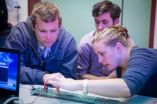(Press-News.org) CORVALLIS, Ore. – People with facial paralysis are perceived as being less happy simply because they can't communicate in the universal language of facial expression, a new study from an Oregon State University psychology professor shows.
The findings highlight the important role the face plays in everyday communication and indicates people may hold a prejudice against those with facial paralysis because of their disability, said Kathleen Bogart, an assistant professor of psychology in the College of Liberal Arts at Oregon State University.
"People are more wary and more likely to form a negative impression of someone with a disability," Bogart said. "Identifying that stigma is the first step to addressing it."
Bogart specializes in research on ableism, or prejudice about disabilities. Much of her work focuses on the psychosocial implications of facial movement disorders such as facial paralysis and Parkinson's disease, which affect more than 200,000 Americans each year.
"Facial paralysis is highly visible," Bogart said. "Everyone notices there's a difference, but people have no idea why. They don't understand the nature of the condition."
Some basic facial expressions, including the smile, are communicated universally across cultures. But people with facial paralysis or other facial movement disorders may not be able to participate in that communication because they lack emotional expression and may seem unresponsive in social situations.
To better understand how those with facial paralysis are perceived by those without facial paralysis, Bogart conducted an experiment comparing how emotions are perceived based on different forms of communication.
About 120 participants, none of whom had facial paralysis, watched or listened to videos of people with varying degrees of facial paralysis and were asked to rate the subject's emotions as the person recounted happy or sad experiences. Participants were assigned to videos highlighting several communication channels, including video of just the person's face; video of the person's face and body; or voice-only audio with no video; as well as combinations of different types of communication.
Those with severe facial paralysis were rated as less happy than those with milder facial paralysis across all the different communication types and combinations. Those with severe facial paralysis were also rated as less sad than those with milder facial paralysis.
The findings confirmed that people with facial paralysis experience stigma, but it also confirmed that people often rely on a combination of communication channels to perceive emotions, Bogart said.
That's important because people with facial paralysis can adapt other communication channels, such as tone of voice or gestures, to enhance their communication ability, she said. Also, people interacting with someone with facial paralysis can be more watchful of other communication cues that might indicate emotion, she said.
"It's not all about the face," Bogart said. "Studies like this tell us more about the way people communicate, verbally and non-verbally."
Her findings were published recently in the journal Basic and Applied Social Psychology. Co-authors of the study are Linda Tickle-Degnen of Tufts University and Nalini Ambady of Stanford University. The research was supported by a grant from the National Institutes of Health.
Bogart is now studying ways to help people with facial paralysis use compensatory strategies to improve communication. She has developed a social skills workshop for teenagers with facial paralysis and hopes to do more work like that in the future.
"We know these strategies work, so let's teach people to use those skills more," she said. "A lot of people with facial paralysis do just fine, but there are some people who would like help or support."
Making people aware of the stigma about facial paralysis and educating them about the causes and effects is the biggest key to reducing existing misconceptions and prejudices, Bogart said.
"People need to be able to recognize facial paralysis, and understand that they may need to pay more attention to communication cues beyond facial expression," she said.
INFORMATION:
Lack of facial expression leads to perceptions of unhappiness, new OSU research shows
2014-09-17
ELSE PRESS RELEASES FROM THIS DATE:
Entrepreneurs aren't overconfident gamblers
2014-09-17
Leaving one's job to become an entrepreneur is inarguably risky. But it may not be the fear of risk that makes entrepreneurs more determined to succeed. A new study finds entrepreneurs are also concerned about what they might lose in the transition from steady employment to startup.
In Entrepreneurship and Loss-Aversion in a Winner-Take-All Society, Professor John Morgan at UC Berkeley's Haas School of Business and co-author Dana Sisak, assistant professor at the Erasmus University Rotterdam, focused on the powerful impact of loss aversion.
Loss aversion, or the fear ...
Oxides discovered by CCNY team could advance memory devices
2014-09-17
The quest for the ultimate memory device for computing may have just taken an encouraging step forward. Researchers at The City College of New York led by chemist Stephen O'Brien have discovered new complex oxides that exhibit both magnetic and ferroelectric properties.
Combining both properties is very exciting scientifically for the coupling that can occur between them and for the devices that might ultimately be designed, in logic circuits or spintronics. Combining these two properties in a single material, however, has proved difficult until now.
Using an innovative ...
Engineers develop algorithms to switch out and recharge battery modules in electric cars
2014-09-17
Imagine being able to switch out the batteries in electric cars just like you switch out batteries in a photo camera or flashlight. A team of engineers at the University of California, San Diego, are trying to accomplish just that, in partnership with a local San Diego engineering company.
They have developed smaller units within the battery, called modules, and a battery management system that will allow them to swap out and recharge the modules, rather than swapping out the whole battery, which is cumbersome and requires large, heavy equipment. They recently presented ...
US health system not properly designed to meet needs of patients nearing end of life, says IOM
2014-09-17
WASHINGTON -- The U.S. health care system is not properly designed to meet the needs of patients nearing the end of life and those of their families, and major changes to the system are necessary, says a new report from the Institute of Medicine. The 21-member committee that wrote the report envisioned an approach to end-of-life care that integrates traditional medical care and social services and that is high-quality, affordable, and sustainable. The committee called for more "advance care planning" for end-of-life by individuals, for improved training and credentialing ...
First blood test to diagnose depression in adults
2014-09-17
CHICAGO --- The first blood test to diagnose major depression in adults has been developed by Northwestern Medicine® scientists, a breakthrough approach that provides the first objective, scientific diagnosis for depression. The test identifies depression by measuring the levels of nine RNA blood markers. RNA molecules are the messengers that interpret the DNA genetic code and carry out its instructions.
The blood test also predicts who will benefit from cognitive behavioral therapy based on the behavior of some of the markers. This will provide the opportunity for more ...
Many throat cancer patients can skip neck surgery
2014-09-17
A new study shows that patients with human papillomavirus (HPV) – the same virus associated with both cervical and head and neck cancer – positive oropharyngeal cancer see significantly higher rates of complete response on a post-radiation neck dissection than those with HPV-negative oropharyngeal cancer. Fox Chase Cancer Center researchers presented the findings at the American Society for Radiation Oncology's 56th Annual Meeting on Wednesday, September 17.
"For patients that achieve a complete response, neck surgery is probably unnecessary," says Thomas J. Galloway, ...
Five genes to predict colorectal cancer relapses
2014-09-17
Researchers at the Catalan Institute of Oncology-Bellvitge Biomedical Research Institute (ICO-IDIBELL), led by David Garcia-Molleví have identified 5 genes differentially expressed in normal accompanying cells in colorectal tumors. Analysis of these genes could be used to classify colorectal tumors, predict the evolution of the patient and thus take appropriate clinical decisions to prevent relapses.
Biomarkers
Colorectal cancer is the most common in our population considering both sexes. About 30,000 new cases are diagnosed each year. Of these, approximately 70% are ...
Abnormal properties of cancer protein revealed in fly eyes
2014-09-17
EAST LANSING, Mich. – Mutations in the human retinoblastoma protein gene are a leading cause of eye cancer. Now, Michigan State University scientists have turned to fruit fly eyes to unlock the secrets of this important cancer gene.
In a paper featured on the cover of the current issue of the Journal of Biological Chemistry, Michigan State University researchers provide the first detailed examination of a set of mutations similar to those present in the human cancer gene, said Irina Pushel, MSU undergraduate and co-author.
"By systematically evaluating mutations of ...
Moffitt researchers help lead efforts to find new genetic links to prostate cancer
2014-09-17
Researchers at Moffitt Cancer Center, including Center Director Thomas A. Sellers, Ph.D., M.P.H., Jong Park, Ph.D. and Hui-Yi Lin, Ph.D., have discovered 23 new regions of the genome that influence the risk for developing prostate cancer, according to a study published Sept. 14 in Nature Genetics.
Prostate cancer is the most common non-skin cancer in American men. About 1 in 6 men will be diagnosed with the disease in his lifetime. Family history is the strongest risk factor. A man with one close relative, a brother or father with prostate cancer is twice as likely to ...
Yoga may help people with bipolar disorder, reports Journal of Psychiatric Practice
2014-09-17
September 17, 2014 – People with bipolar disorder who do yoga believe their yoga practice has significant mental health benefits, reports a survey study in the September Journal of Psychiatric Practice. The journal is published by Lippincott Williams & Wilkins, a part of Wolters Kluwer Health.
"Some individuals with bipolar disorder believe that yoga has had a significant positive impact on their life." according to the study by Dr Lisa A. Uebelacker of Butler Hospital and Brown University, Providence, R.I., and colleagues. But they note their survey shows that yoga ...




